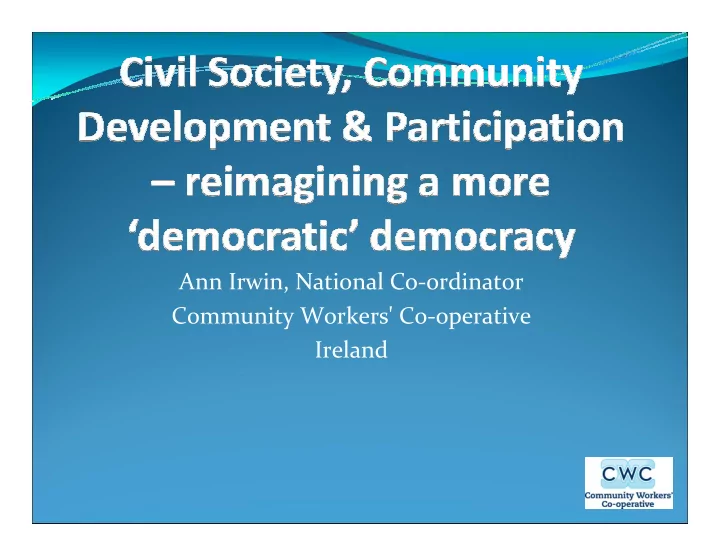

Ann Irwin, National Co-ordinator Community Workers' Co-operative Ireland
� Established in 1981, the Community Workers Co- operative (CWC) is a national organisation that promotes and supports community work as a means of achieving social change that will contribute to the creation of a more just, sustainable and equal society. � For us, community development is an activity composed of a task and a process. The task is the achievement of social change linked to equality and social justice; the process is the application of the principles of participation, empowerment and collective decision making...
Empowerment & Democracy � I was asked to speak about participation – which I thought would be relatively easy, since I strongly believe that participation is a key principle. � However, the more I thought about it in preparation for today, the more complex the notion of participation became....
� The general theme of this morning’s conversation is empowerment and democracy � For the CWC, democracy, civil society and community development are intrinsically linked. � We believe that civil society - which is the independent, self organising sector of organisations, usual motivated by a sense of social justice – is crucial to democracy and can provide a counter balance to other influences on the political system � Community development is then crucial for supporting the participation of those most disadvantaged and marginalised from the political and other systems � Ironically, in Ireland, the independent community sector, so crucial for an independent civil society and democracy, is being dismantled by the State
Types of democracy � Many believe that there is only one form of democracy – in fact there are many. � The CWC would be critical of the type of democracy that characterises Irish, and may other, democracies. � In Ireland, as in much of Europe and the Western World, we operate a restrictive form of representative democracy . � Our main participation in the democratic process is in the act of electing what are overwhelming middle aged, middle class men to represent us � Do they really represent what are increasingly diverse and varied societies and populations?
Participatory Democracy � Participatory democracy, on the other hand, argues for a much greater role for ‘citizens’ (I use this term in its loosest sense as it is a term that is being increasingly used to exclude those who do not fall under the narrow definitions of citizenships in Ireland and, I am sure, elsewhere).
Community Development � Participation is one of the key principles of community development � We believe that community development is the key mechanism that supports, facilitates and empowers people experiencing poverty and social exclusion to ‘find their voice’ � We argue that policy making, at local, regional, national and international levels, is only effective if it is influenced by the participation of those experiencing poverty ad social exclusion
Why participate? � But it is important to ask: � What is participation? and � Participation to what end?
What is participation � Participation is a continuum � Participation can be anything from participation by telling your story in the hope that the reality will education and influence policy makers positively � Participation can be responding when you are asked a question about something. This type of participation is generally called consultation and is a valid form of participation.
Participation in community development � In community development, we talk about participation - in terms of a means to an end � The end is � Individual empowerment � Collective change
� So, for us, participation is the first step in making real changes to individual and collective realities � Community activism is core to this. In community development people who are affected by the issue are involved at all levels of the work – for example, Traveller community activists would be involved at all levels of work and management in Traveller organisations. � This community activism often requires support
Participation - to what end? � This question is far more difficult and forces us to acknowledge that we cannot speak about participation in isolation from the political realities that frame it � This further forces us to acknowledge that, often times, we are participating but nothing is changing as a result � We are telling our stories but though we are placated and told that we are doing a wonderful job, we are still left in poverty or social exclusion � We are being ‘consulted’ but rarely, if ever, see what we say reflected
Conclusion � This is a challenge � People often get despondent – people are often tired of being ‘consulted’
� It is more important, therefore, to ensure that participation in civil society – community organisations, community activism - is meaningful � It is also important to ensure that pressure is maintained to ensure that the experience of poverty and social exclusion is a key influencer in all policies that impact on people at EU and member State level. � Most of all - it is important to imagine a more ‘democratic’ democracy where the experience of people in poverty and social exclusion becomes the first step in the journey from poverty and social exclusion – and in this 2010 Year to Combat Poverty and Social Exclusion – to say to say that poverty and social exclusion are unacceptable.
Recommend
More recommend